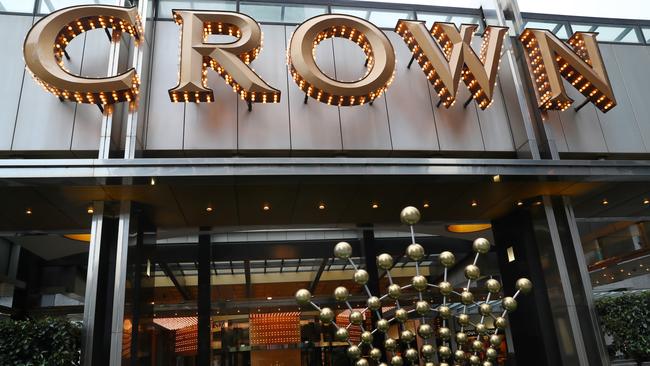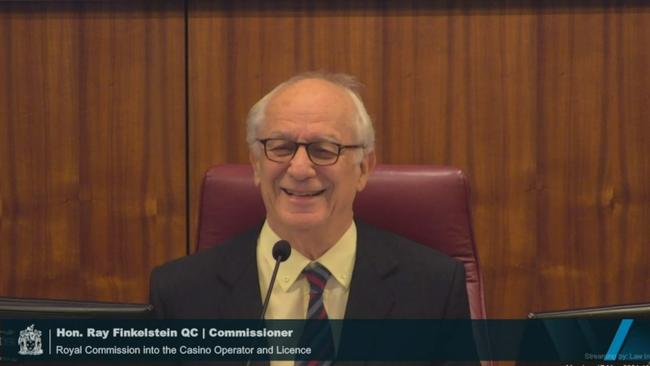
Separate rules and agreements are emerging between the casino giant and NSW and Victorian regulators in regard to its Sydney and Melbourne operations as it moves to smooth out regulatory risks plaguing the company.
But four days into the Victorian royal commission into the casino giant, one state has a clear edge over the other.
Crown’s sprawling Melbourne casino complex has been a feature of the city for more than quarter of a century, while its younger $2.2bn sibling in Sydney was only completed last December.
But it took a NSW inquiry to shake Crown to its core after it found the James Packer-backed company facilitated money laundering and organised crime at its flagship operations south of the border.
Already, the Victorian royal commission, cobbled together to save face after the explosive revelations from the Bergin inquiry, has shown that Victoria continues to lag behind NSW.
“This might be read as a statement of Crown’s present intention, but nevertheless, the issues for the commission to consider are whether the junkets should be allowed at the Melbourne casino at all in the future,” said counsel assisting the royal commission, Penny Neskovcin QC.
Then on Friday, it was revealed the NSW regulator had again leapfrogged its Victorian counterpart, steaming ahead in its plan to make all casinos in its state cashless in an effort to crush the prospect of money laundering. This is despite not one bet being placed on the gaming floors of Crown’s shiny new casino in Barangaroo.
Meanwhile, in Victoria, where the said money laundering took place, the casino said it may only implement cashless transactions at a threshold of a few thousand dollars.
Victoria likes to think of itself as Australia’s progressive state, and despite bungling its hotel quarantine scheme it introduced tougher lockdowns and restrictions than any other jurisdiction in Australia. And while NSW completed an inquiry into Crown, Premier Dan Andrews went one step further, announcing a full-blown royal commission, albeit in an expedited six-week time frame.
West Australian Premier Mark McGowan also chimed in, announcing his state would complete its own royal commission to get to the bottom of what’s been going on at the Burswood casino, which has been under Crown’s control since 2007.

The reality is, it was the actions of the NSW regulator — without the formality of a royal commission — that finally brought Crown to heel, ending an era of unbridled arrogance.
Crown’s legal counsel trumpeted that it had made a “market-leading” decision by severing ties with all junket operators. But that was only well after the Bergin inquiry began and despite the Victorian Commission for Gambling and Liquor Regulation (VCGLR) trying to get Crown to crack down on junket operators for more than two years. And when it wasn’t happy with the VCGLR’s work, it threatened to call Victoria’s gaming minister.
On top of that, the Victorian royal commission this week heard the VCGLR — which is funded to the tune of $38m a year — took almost four years to complete an investigation into the arrests of 19 Crown staff in China in 2016.
It wasn’t as though the VCGLR wasn’t trying its best. In a lengthy report, the regulator said Crown was “unnecessarily belligerent” and prolonged the investigation.
The way Crown treated the Victorian regulator — which has completed six reviews into the company, all recommending that retain the state’s only casino licence — did not go unnoticed by commissioner Ray Finkelstein.
“Would the next step be to see whether … the regulated firm, the casino operator, who thumbs its nose at the regulator, remains a suitable person to hold the licence?” Mr Finkelstein asked, in his affable yet forensic way of drilling down to point of what the royal commission is setting out to achieve.
But it’s not only the VCGLR that Crown has frustrated. When its group general manager of anti-money laundering (AML), Nick Stokes, joined the company in 2019 after a 20-year career helping banks fight financial crime, he had his own laundry list of what Crown needed to do to combat criminal infiltration.
“Because I was new to casinos, and so coming from banking, straight away I thought the team was not resourced appropriately. I was asked within two, three weeks to provide an early assessment of resourcing,” Stokes said.
“We had two staff in Perth, two staff in Melbourne, and myself, so five people. And it was very obvious that we were under-resourced.”
Again, it wasn’t until after the Bergin hearings began and subsequent negative media coverage that Stokes was able to build his team to 20 to ensure it was fit for purpose.
The reason it took so long was because Stokes’s then supervisor — Crown’s former AML head and chief legal officer Joshua Preston — didn’t believe the team needed more resources, despite Crown indeed having been infiltrated by organised crime and money launderers.
“My view is that at the time it was one that the junket business had always been run that way, and that no one had told them any better. So they continue to do things that way,” Stokes said.
On Friday, Finkelstein attempted to drill deeper, asked: “Did you believe that Crown was too focused on wealth and not enough on the risks associated with money laundering?”
The question was in response to a note making that suggestion from an interview Stokes gave Deloitte when it was completing a review of Crown’s relationship with junket operators.
“I was looking at more of the fact that there wasn’t enough focus on risk management,” Stokes replied, not satisfying Finkelstein.
“I didn’t ask that question. I said, ‘Did you believe that plan was to focus on wealth, rather than the risks associated with money laundering?’,” the commissioner asked.
Stokes replied: “I cannot say with any certainty that I, that I actually had thought about it that way,” adding that he could not recall there being a conversation along those lines at Crown.
To which Finkelstein ended his questioning with a dry “Righto”.








Crown Resorts might as well be operating in different countries instead of three Australian states.